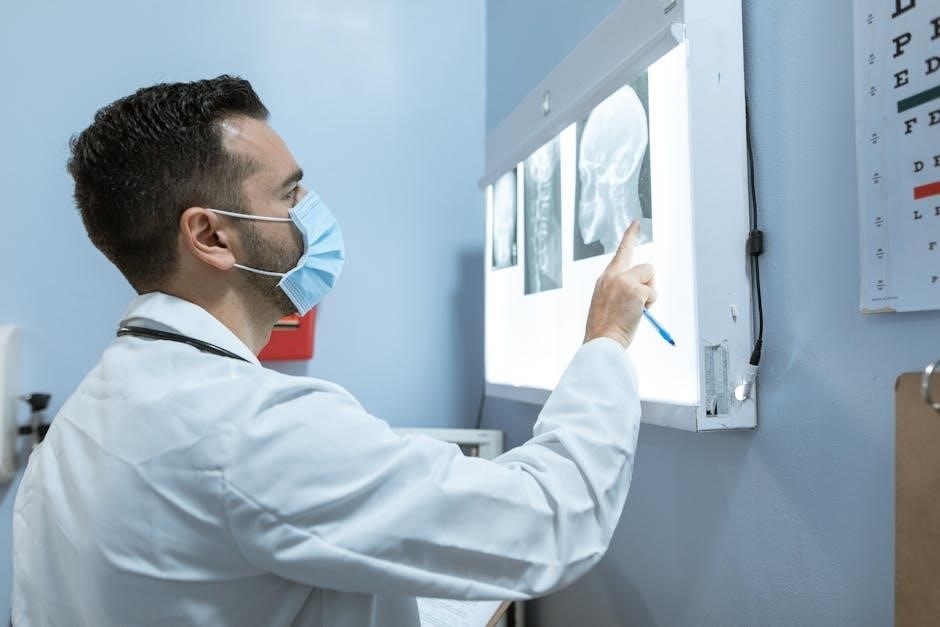Clinical medicine for physician assistants involves the application of scientific evidence and clinical expertise to patient care․ It integrates evidence-based medicine‚ clinical experience‚ and patient preferences to guide decision-making․
PAs must develop strong history-taking and physical examination skills‚ interpret diagnostic tests‚ and apply therapeutic interventions effectively․ Staying updated with medical advancements ensures high-quality‚ patient-centered care․
Overview of the Physician Assistant Role in Clinical Medicine
Physician assistants (PAs) play a vital role in clinical medicine‚ working autonomously and collaboratively with physicians to deliver high-quality patient care․ PAs are trained to diagnose and manage illnesses‚ conduct physical exams‚ interpret diagnostic tests‚ and develop treatment plans․ They integrate evidence-based medicine‚ patient preferences‚ and clinical experience to guide decision-making․ PAs work across various specialties‚ ensuring comprehensive and patient-centered care․ Their role bridges the gap between primary and specialized care‚ making them essential contributors to the healthcare system․
Importance of Evidence-Based Medicine in PA Practice
Evidence-based medicine (EBM) is a cornerstone of physician assistant practice‚ ensuring care is grounded in the best scientific evidence․ By integrating clinical expertise with patient preferences‚ PAs deliver high-quality‚ personalized care․ EBM enhances diagnostic accuracy‚ treatment efficacy‚ and patient safety‚ reducing errors․ Staying updated with medical literature and guidelines is crucial for PAs to apply evidence-based practices effectively․ This approach fosters critical thinking and lifelong learning‚ enabling PAs to provide care that aligns with current standards and improves patient outcomes․

Key Resources for Physician Assistants in Clinical Medicine
Physician assistants rely on evidence-based resources like PubMed‚ clinical guidelines‚ and systematic reviews for informed decision-making․ Tools like UpToDate and ClinicalKey provide accessible‚ evidence-based information․ Professional organizations‚ such as the American Academy of Physician Assistants (AAPA)‚ offer educational resources․ Additionally‚ academic guides from institutions like USC and UIC provide structured learning materials․ These resources ensure PAs stay updated‚ enhance their knowledge‚ and improve patient care effectively through efficient literature searching and evidence-based practices․

Core Concepts in Clinical Medicine
Clinical medicine involves patient-centered care‚ evidence-based practices‚ and precise diagnostic techniques․ Physician assistants must integrate medical knowledge‚ clinical skills‚ and ethical practices to deliver safe‚ effective care․
Developing Good Clinical Questions
Developing good clinical questions is a cornerstone of evidence-based medicine․ Physician assistants should formulate questions using the PICO framework: Patient‚ Intervention‚ Comparison‚ and Outcome․ This approach helps clarify clinical uncertainties and guides effective literature searches․ Well-crafted questions improve diagnostic accuracy and treatment decisions․ Staying updated with medical literature and using resources like PubMed ensures access to the latest evidence․ Regular practice in framing questions enhances critical thinking and patient care․ This skill is essential for integrating evidence‚ experience‚ and patient preferences in clinical practice․
Integrating Patient Preferences and Physician Experience
Integrating patient preferences and physician experience is vital in clinical decision-making․ Physician assistants must consider patients’ values‚ beliefs‚ and goals alongside clinical evidence․ This patient-centered approach ensures tailored care and shared decision-making․ Effective communication and empathy are key to understanding patient preferences․
Clinical experience provides context and intuition‚ guiding the application of evidence-based medicine․ Balancing these elements fosters trust and improves outcomes․ PAs must stay updated on evidence while respecting individual patient needs‚ ensuring care is both effective and personalized․
Best Practices for Staying Updated with Medical Literature
Staying updated with medical literature requires a proactive approach․ Physician assistants should regularly use PubMed and other databases to find relevant studies․ Efficient search strategies‚ such as using keywords and filters‚ can save time and improve results․ Leveraging systematic reviews and meta-analyses is also crucial‚ as they provide synthesized evidence on key topics․
Setting up alerts for new publications and subscribing to clinical question-answering systems like UpToDate or DynaMed can streamline updates․ Balancing literature review with clinical experience ensures practical application of evidence-based medicine in daily practice․

Diagnostic Techniques and Clinical Decision-Making
Diagnostic techniques and clinical decision-making involve a combination of physical exams‚ history-taking‚ and interpreting lab tests․ These elements guide PAs in making informed‚ patient-centered care decisions․
Physical Examination and History-Taking Skills
Physical examination and history-taking are foundational skills for physician assistants‚ enabling accurate diagnoses and personalized care․ These skills involve thorough patient interviews‚ detailed documentation‚ and systematic physical assessments to identify abnormalities and guide further testing․ Effective communication and empathy are critical in gathering comprehensive patient histories‚ addressing concerns‚ and building trust․ These skills are refined through clinical experience and evidence-based medicine‚ ensuring PAs provide high-quality‚ patient-centered care․ Staying updated with medical advancements and using efficient search strategies further enhance diagnostic accuracy and decision-making․
Interpreting Lab Tests and Diagnostic Imaging

Interpreting lab tests and diagnostic imaging is crucial for physician assistants to accurately diagnose and manage patient conditions․ Lab tests‚ such as complete blood counts or basic metabolic panels‚ provide essential data on underlying pathologies․ Diagnostic imaging‚ including X-rays‚ MRIs‚ and CT scans‚ offers visual insights into anatomical abnormalities․ PAs must integrate clinical findings with patient history and physical exam results to guide treatment decisions․ Staying updated on advancements in diagnostic techniques and evidence-based interpretation ensures accurate and effective care․ Efficient use of clinical guidelines and medical literature further enhances diagnostic accuracy and patient outcomes․
Effective Use of Clinical Guidelines
Clinical guidelines are systematically developed statements designed to assist physician assistants in making decisions about patient care․ They are derived from the best available evidence and expert consensus‚ ensuring standardized‚ high-quality care․ PAs should integrate guidelines into daily practice‚ considering patient preferences and clinical experience․ Guidelines help reduce variability in care and improve patient outcomes․ Regularly reviewing and updating guidelines is essential to reflect current evidence․ PAs should also critically evaluate the quality of guidelines using frameworks like AGREE or GRADE to ensure they are reliable and applicable to their practice settings․

Evidence-Based Medicine (EBM) for Physician Assistants
Evidence-Based Medicine (EBM) for Physician Assistants involves integrating the best scientific evidence with clinical experience and patient preferences to guide decision-making‚ optimizing patient care and outcomes․
Systematic Reviews and Meta-Analyses
Systematic reviews and meta-analyses are essential tools in evidence-based medicine‚ providing synthesized data from multiple studies to guide clinical decision-making․ These reviews follow a structured methodology to minimize bias and ensure reliability․ For physician assistants‚ they offer high-level evidence to inform practice‚ helping to identify effective interventions and treatments․ Meta-analyses further enhance this by quantitatively pooling data‚ strengthening conclusions․ Regularly reviewing these resources enables PAs to stay updated on best practices and integrate evidence into patient care effectively․
Clinical Question Answering Systems
Clinical question answering systems are innovative tools designed to provide healthcare professionals with accurate and timely evidence-based information․ These systems use advanced algorithms to synthesize data from vast medical databases‚ guidelines‚ and research articles․ For physician assistants‚ they serve as invaluable resources during patient encounters‚ enabling quick access to relevant clinical information․ By improving diagnostic accuracy and treatment decisions‚ these systems enhance patient outcomes and support evidence-based practice‚ making them indispensable in modern clinical medicine․
Applying EBM in Daily Practice
Applying Evidence-Based Medicine (EBM) in daily practice involves integrating the best available evidence with clinical expertise and patient preferences․ Physician assistants should formulate clinical questions using the PICO framework‚ search for high-quality evidence‚ and evaluate its validity․ Staying updated with systematic reviews and guidelines ensures informed decision-making․ By incorporating EBM into routine care‚ PAs can enhance patient outcomes‚ reduce variability‚ and improve the quality of clinical practice․ Regularly reviewing and applying new evidence fosters a culture of lifelong learning and excellence in patient care․

Technology in Clinical Medicine
Technology enhances clinical medicine through tools like question answering systems‚ advanced search strategies‚ and evidence-based resources‚ aiding PAs in efficient‚ informed decision-making and care delivery․
Question Answering Systems for Health Professionals
Question answering systems are powerful tools that provide health professionals with rapid access to evidence-based information‚ enhancing clinical decision-making․ These systems‚ integrated into clinical workflows‚ enable PAs to quickly retrieve relevant data during patient consultations‚ improving efficiency and accuracy․ By leveraging advanced search strategies and databases like PubMed‚ they facilitate access to the latest medical literature‚ ensuring informed care․ Such systems also support continuing education and adherence to clinical guidelines‚ ultimately improving patient outcomes and safety in clinical practice settings․
PubMed Search Tips and Expert Searching
Mastering PubMed search techniques is essential for physician assistants to efficiently find high-quality evidence․ Using quotation marks for exact phrases and applying filters can refine results․ Employ Boolean operators like AND‚ OR‚ and NOT to narrow or broaden searches․ Advanced features‚ such as Clinical Queries‚ help identify relevant studies quickly․ Regularly updated search strategies ensure access to the latest medical advancements‚ enabling PAs to make informed‚ evidence-based decisions in clinical practice;
Efficient Health Literature Search Strategies
Efficient health literature searching is crucial for physician assistants to quickly access relevant evidence․ Techniques include using Boolean operators‚ quotation marks for phrases‚ and filters like Clinical Queries on PubMed․ Utilizing MeSH terms ensures precise searches․ Step-by-step guides and advanced strategies help refine results‚ saving time․ Regular updates on search methods and tools enable PAs to stay current with medical advancements‚ supporting evidence-based clinical decisions and improving patient care outcomes․

Professional Development for Physician Assistants
Professional development for PAs involves career pathways‚ specialization opportunities‚ and lifelong learning․ Staying updated with medical literature and preparing for interviews are key․ Choosing research topics wisely enhances growth․
Career Pathways and Specialization Opportunities
Physician assistants can explore diverse career pathways across various medical specialties and settings‚ including primary care‚ surgery‚ and hospital medicine․ Specialization opportunities abound‚ such as emergency medicine‚ orthopedics‚ and dermatology․ PAs can also pursue roles in education‚ research‚ or healthcare administration․ Certifications in specialized areas enhance career advancement and expertise․ Additionally‚ the growing demand for PAs in underserved areas offers fulfilling opportunities to make a difference․ With continuous learning and adaptability‚ PAs can tailor their careers to align with personal and professional goals‚ ensuring a dynamic and rewarding profession․
PA School Interview Preparation
Preparing for PA school interviews involves researching common questions and practicing thoughtful responses․ Focus on showcasing your passion for the profession‚ clinical experience‚ and alignment with the program’s mission; Be ready to discuss your motivation for becoming a PA and how your background prepares you for the role․
Additionally‚ review your personal statement‚ highlighting unique experiences and skills․ Practice discussing clinical scenarios and staying updated on medical trends․ Ensure professionalism in demeanor and attire‚ demonstrating readiness to contribute to the PA program and the healthcare field․
Choosing a Research Topic in Clinical Medicine
Choosing a research topic in clinical medicine requires aligning your interests with patient care and gaps in current literature․ Identify areas where evidence is limited or evolving‚ ensuring relevance to clinical practice․
Consult mentors‚ review recent studies‚ and consider real-world challenges faced by PAs․ Ensure your topic is feasible‚ ethical‚ and contributes meaningfully to the field of clinical medicine and patient outcomes․

Clinical medicine for physician assistants is a dynamic field requiring the integration of evidence-based practices‚ clinical expertise‚ and patient-centered care․ By staying updated with medical literature‚ mastering diagnostic techniques‚ and leveraging technology‚ PAs can enhance their practice and improve patient outcomes․ Continuous learning and adaptability are key to thriving in this evolving profession‚ ensuring high-quality care and professional growth․



0 Comments